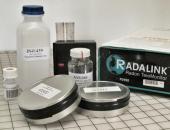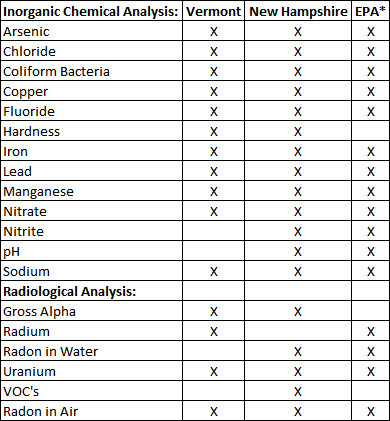 In addition to inspection services, Criterium-Dudka Engineers provides radon testing and full-service environmental testing throughout Vermont, Massachusetts, and Western New Hampshire. This is an independent service using certified laboratories and products chosen according to credentials, reliability, and timeliness.
In addition to inspection services, Criterium-Dudka Engineers provides radon testing and full-service environmental testing throughout Vermont, Massachusetts, and Western New Hampshire. This is an independent service using certified laboratories and products chosen according to credentials, reliability, and timeliness.
Our services include:
- Total Coliform Bacteria Water Test
- HUD Scan Water Test
- Recreational Water/E. coli Test (seasonal-June 1-Sept 1 only)
- Inorganic Chemicals plus Total Coliform Bacteria Water Analysis (recommended)
- Combined Inorganic Chemicals before Water Treatment Equipment Water Test
- Volatile Organic Chemicals Water Test
- Synthetic Organic Chemicals Water Test
- First Draw and Flush Lead and Copper Water Test
- Electronic Continuous Monitor Radon in Air Test
- Radon in Water Test
- Gross Alpha Water Test
- Radium 226 and 228
- Uranium
Radon in Air Testing
Radon-Air Testing is recommended every 1 to 3 years.
- The EPA, the Surgeon General, and the American Lung Association recommend that all homes below the 3rd level be tested for radon gas since long-term exposure to radon gas is the second leading cause of lung cancer.
- The average outside radon in air level is 0.4 picocuries per liter (pCi/L) and the average indoor level is 1.3 pCi/L.
- In a Vermont residence there is a 1 in 8, chance that the radon in air level is at or above the EPA action level of 4.0 pCi/L. In New Hampshire there is a 30%, or approximately 1 in 3, chance of having an elevated level in the home.
- The average mitigation cost to reduce radon in air levels is between $800 – $2,500.
- Radon in air levels constantly fluctuate. It is prudent to follow-up a screening test with a year-long alpha track test (the most accurate radon test to obtain a yearly average).
Radon in Water Testing
Why should I test for Radon in my water:
- Radon in water contributes to the radon in air level.
- For every 10,000 pCi/L of radon in the water supply, the radon in air concentration is increased by 1 pCi/L.
- Long-term ingestion of elevated levels of radon in water can cause cancer in the stomach and other internal organs.
- The EPA proposed action level for private water supplies is 4,000 pCi/L (which the Vermont Department of Health defers to).
- The New Hampshire Department of Health and Human Services has established 10,000 pCi/L as the action level for private water supplies.
- Mitigation costs to reduce radon in water can run in excess of $5,000.
Coliform Bacteria Test
It is recommended to perform a Coliform Bacteria Test annually. The Coliform Bacteria Test tests the integrity of the well and the possible presence of disease-causing organisms. The presence of coliform bacteria could indicate the infiltration of groundwater and, thus, disease-causing organisms. If present, the water is considered unsafe to drink until corrective measures are taken.
Combined Inorganic Chemicals Water Test
This test is recommended every 3 to 5 years, and Criterium-Dudka Engineers is here to help.
The Combined Inorganic Chemicals Test includes primary (health-related) and secondary (aesthetic) standards. Secondary standards determine if a water treatment system is needed or is functioning. The Combined Inorganic Chemicals Test includes 4 primary standards: lead, arsenic, nitrates, and nitrites. Lead and arsenic can occur naturally. Arsenic was used in embalming and as a pesticide in apple orchards. High nitrate or nitrite levels can indicate pesticides or a failed septic system.
Gross Alpha Water Test
The Vermont Department of Health, the New Hampshire Department of Health and Human Services, and the EPA recommend conducting a Gross Alpha Test on private wells. It is recommended to perform the Gross Alpha Water Test every 5 years.
- Gross Alpha is an initial screening test for radioactive particles, which can occur naturally, such as radium and uranium minus radon.
- Long term exposure to radium can increase one’s risk of bone cancer and long term exposure to uranium can increase ones risk of kidney damage.
- If the Gross Alpha test result is 5.0 pCi/L or higher further testing is recommended to identify the specific elements.
Test kits and other resources:
- Vermont Department of Health: http://www.healthvermont.gov/lab/drinking-water
- Vermont Department of Health List of Certified Laboratories: http://www.healthvermont.gov/sites/default/files/documents/pdf/PHL_ListofCertifiedLaboratoryDW08022017.pdf
- New Hampshire Department of Environmental Services: http://des.nh.gov/organization/commissioner/lsu/documents/water_testing.pdf
- New Hampshire Accredited Drinking Water Labs:
- http://des.nh.gov/organization/divisions/water/dwgb/documents/accredited-labs-esamples.pdf
- http://www2.des.nh.gov/CertifiedLabs/Certified-Method.aspx
- United States Environmental Protection Agency: http://water.epa.gov/drink/index.cfm
Additional information about environmental testing
- EPA drinking water: www.epa.gov/safewater/
- New Hampshire Department of Health and Human Services drinking water: https://www.des.nh.gov/organization/divisions/water/dwgb/well_testing/index.htm
- Vermont Department of Health drinking water: http://www.healthvermont.gov/lab/drinking-water
- EPA radon information: http://www.epa.gov/radon/index.html
- AARST-NRPP-Radon professionals and resources: http://aarst-nrpp.com/wp/
- EPA radon in water information: https://archive.epa.gov/water/archive/web/html/index-9.html
State & Federal Recommendations for Private Wells

Important Consideration: In addition to health risks, there is a possible financial liability at the time of resale if elevated levels have not been detected and lowered.
For more information about Radon-Air Testing or to schedule a test with us, call us at 844-885-0153 or request an inspection online.
